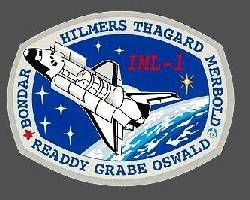
Home - Search - Browse - Alphabetic Index: 0- 1- 2- 3- 4- 5- 6- 7- 8- 9
A- B- C- D- E- F- G- H- I- J- K- L- M- N- O- P- Q- R- S- T- U- V- W- X- Y- Z
STS-42
 STS-42 Credit: www.spacefacts.de |
AKA: Discovery;Spacelab IML-1. Launched: 1992-01-22. Returned: 1992-01-30. Number crew: 7 . Duration: 8.05 days.
Payloads: International Microgravity Laboratory (IML)-1, getaway special (GAS) bridge with 10 getaway specials, IMAX camera, Gelation of Sols: Applied Microgravity Research (GOSAMR)-1, Investigations Into Polymer Membrane Processing (IPMP), Radiation Monitoring Equipment (RME)-III, Student Experiment 81-09: Convection in Zero Gravity, Student Experiment 83-02: Capillary Rise of Liquid Through Granular Porous Media.
Orbits of Earth: 129. Distance traveled: 5,407,122 km. Orbiter Liftoff Mass: 110,402 kg. Orbiter Mass at Landing: 98,888 kg. Payload to Orbit: 13,001 kg. Payload Returned: 13,001 kg. Landed at: Concrete runway 22 at Edwards Air Force Base, Cali. Landing Speed: 368 kph. Touchdown miss distance: 864 m. Landing Rollout: 2,990 m.
NASA Official Mission Narrative
Mission Name: STS-42 (45)
Discovery (14)
Pad 39-A (44)
45th Shuttle Mission
14th Flight OV-103
Crew:
Ronald J. Grabe (3), Commander
Stephen S. Oswald (1), Pilot
Norman E. Thagard (4) , Mission Specialist 1
David C. Hilmers (4), Mission Specialist 2
William F. Readdy (1), Mission Specialist 3
Roberta L. Bondar (1), Payload Specialist 1 (Canada)
Ulf D. Merbold (2), Payload Specialist 2 (ESA/Germany)
Milestones:
OPF: 9/27/91
VAB: 12/12/91
PAD: 12/19/91
Payload:
IML-01,IMAX-05,GAS(x10),SSIP(x2),GOSAMR,IPMP,
Mission Objectives:
Launch:
Jan. 22, 1992, 9:52:33 a.m. EST. Launch delayed one hour due to weather constraints. Launch Weight: 243,396 lbs.
Orbit:
Altitude: 163nm
Inclination: 57.0 degrees
Orbits: 129
Duration: 8 days, 1 hour, 14 minutes, 44 seconds.
Distance: 2,921,153 miles
Hardware:
SRB: BI-O48
SRM: 360L/Q020
ET : 52/LWT-45
MLP : 3
SSME-1: SN-2026
SSME-2: SN-2022
SSME-3: SN-2027
Landing:
Jan. 30, l992, 8:07:17 a.m. PST Runway 22, Edwards AFB, Calif., Rollout distance: 9,811 feet. Mission extended one day for continued scientific experimentation. Orbiter returned to KSC on Feb. 16, 1992. Landing Weight: 218,016 lbs.
Mission Highlights:
Carried into orbit the International Microgravity Laboratory-1 (IML-1), a pressurized manned Spacelab module, to explore in depth the complex effects of weightlessness on living organisms and materials processing. The international crew, divided into Red and Blue teams, conducted experiments on the human nervous system's adaptation to low gravity and the effects of microgravity on other life forms such as shrimp eggs, lentil seedlings, fruit fly eggs and bacteria. Low gravity materials processing experiments included crystal growth from a variety of substances such as enzymes, mercury iodine and a virus. Other payloads included 10 Get Away Special (GAS) canisters, a number of middeck payloads and two Shuttle Student Involvement Program (SSIP) experiments. Middeck payloads included Gelation of SOLS: Applied microgravity research (GOSAMR), Investigations into Polymer Membrane Processing (IPMP) and the Radiation Monitoring Experiment (RME-III).
More at: STS-42.
Family: Manned spaceflight. People: Bondar, Grabe, Hilmers, Merbold, Oswald, Readdy, Thagard. Country: USA. Spacecraft: Discovery. Projects: STS. Launch Sites: Cape Canaveral. Agency: NASA, NASA Houston.
1992 January 22 - . 14:52 GMT - . Launch Site: Cape Canaveral. Launch Complex: Cape Canaveral LC39A. Launch Platform: MLP3. LV Family: Shuttle. Launch Vehicle: Space Shuttle.
- STS-42 - .
Call Sign: Discovery. Crew: Bondar,
Grabe,
Hilmers,
Merbold,
Oswald,
Readdy,
Thagard.
Payload: Discovery F14 / GBA-3. Mass: 13,001 kg (28,662 lb). Nation: USA.
Related Persons: Bondar,
Grabe,
Hilmers,
Merbold,
Oswald,
Readdy,
Thagard.
Agency: NASA Houston.
Program: STS.
Class: Manned.
Type: Manned spaceplane. Flight: STS-42.
Spacecraft Bus: Shuttle.
Spacecraft: Discovery.
Duration: 8.05 days. Decay Date: 1992-01-30 . USAF Sat Cat: 21846 . COSPAR: 1992-002A. Apogee: 307 km (190 mi). Perigee: 291 km (180 mi). Inclination: 57.00 deg. Period: 90.50 min.
Manned seven crew. Carried International Microgravity Laboratory-1. Payloads: International Microgravity Laboratory (lML)-1, getaway special (GAS) bridge with 10 getaway specials, IMAX camera, Gelation of Sols: Applied Microgravity Research (GOSAMR)-1, Investigations Into Polymer Mem-brane Processing (IPMP), Radiation Monitoring Equipment (RME)-lll, Student Experiment 81-09: Convection in Zero Gravity, Student Experiment 83-02: Capillary Rise of Liquid Through Granular Porous Media.
1992 January 30 - .
- Landing of STS-42 - . Return Crew: Bondar, Grabe, Hilmers, Merbold, Oswald, Readdy, Thagard. Nation: USA. Related Persons: Bondar, Grabe, Hilmers, Merbold, Oswald, Readdy, Thagard. Program: Spacelab. Flight: STS-42. STS-42 landed at 16:07 GMT. .
Back to top of page
Home - Search - Browse - Alphabetic Index: 0- 1- 2- 3- 4- 5- 6- 7- 8- 9
A- B- C- D- E- F- G- H- I- J- K- L- M- N- O- P- Q- R- S- T- U- V- W- X- Y- Z
© 1997-2019 Mark Wade - Contact
© / Conditions for Use